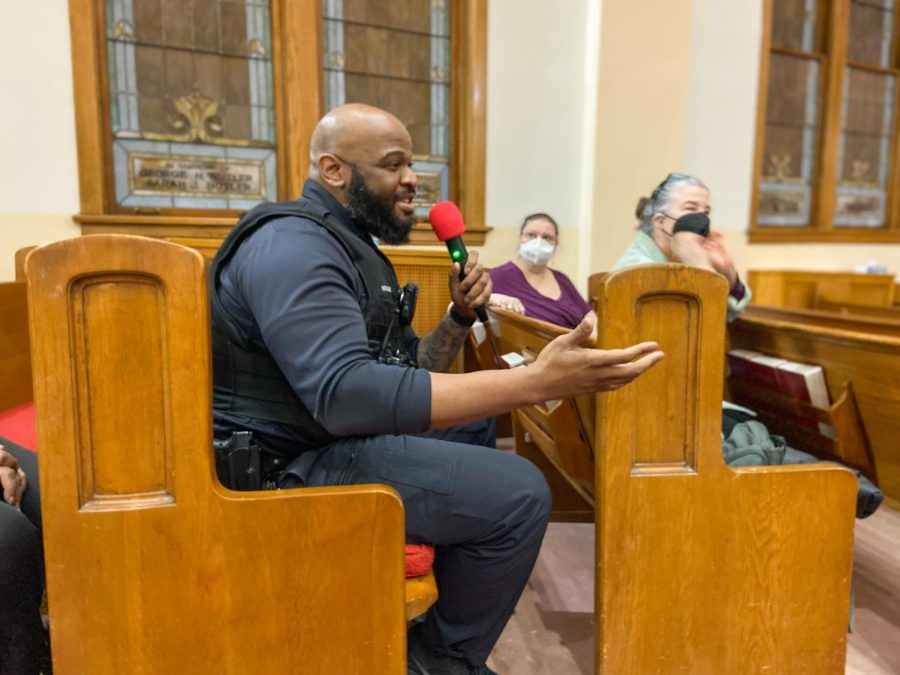EPD, faith leaders discuss local policing after Tyre Nichols’ death
Cole Reynolds/The Daily Northwestern
EPD officer Adam Howard. Howard spoke about trying to connect with youth during Monday’s forum on policing at Second Baptist Church.
February 7, 2023
Content warning: This article discusses police brutality, racism and death.
Evanston Police Department officers and local faith leaders spoke about improving police relations with the community during a Monday forum at the Second Baptist Church.
Community members gathered following Tyre Nichols’ Jan. 10 death at the hands of five Memphis, Tenn. police officers, all of whom are charged with second-degree murder. Evanston Police Chief Schenita Stewart and Second Baptist senior pastor Michael Nabors answered questions from residents about how Evanston police can respond and improve in the wake of Nichols’ death.
The pair said the forum was part of a larger plan to be “proactive” in preventing a similar scenario in Evanston.
“What was disappointing for me is ‘again.’ It keeps happening, again,” Stewart said. “But I think collectively, (the response) can’t be what we always do.”
As policing alternatives, community members discussed the use of speeding cameras instead of traffic stops and ways for non-armed responders to address some crises.
As he watched the video of Nichols’ death, Nabors said he thought about his three sons. He said he worries how they would respond if pulled over by police.
Younger generations, Nabors said, are more willing to question police officers — something he thinks puts them at greater risk for police violence.
“I don’t want to take away that courage, that moral attention to justice,” Nabors said. “But at the same time, I want to see them live to be old.”
Stewart also said she noticed a difference between her generation and younger ones. She claimed the actions of young people spur everyday negative interactions with police.
Those interactions, she argued, are ultimately because of irresponsible parenting.
“I know there’s a lot of focus right now on how police act,” Stewart said. “But we don’t have parents raising kids right now.”
Evanston resident Ndona Muboyayi said focusing on parenting was the wrong conversation for the moment.
She said it was hard not to imagine her own son in Tyre Nichols’ place. According to The New York Times, Nichols tried to obey police commands. The publication found that officers gave Nichols 71 different orders, many of which were confusing, contradictory or physically impossible to obey.
Muboyayi said telling youth to obey the police isn’t nearly enough.
“There’s no way to tell our children to act accordingly, knowing the history of this country,” Muboyayi said at the forum. She told The Daily later, “If an officer is going to do something out of character, they’re going to do it regardless.”
Nabors encouraged people to carry cards made by the NAACP to inform youth how to navigate police interactions.
But for him, police, too, need education about younger generations so they can de-escalate.
“We don’t want police to be offended when a 16- or 18-year-old, who is questioning (them), raises their voice,” Nabors said.
Nabors said he wanted increased partnership between police and community institutions like his church. He said conversations between police and youth need to facilitate mutual education.
Many in attendance agreed with Nabors. Attendees said they wanted officers to take a more active role as community members outside of their law enforcement duties through programs that promote youth mentorship.
Second Baptist minister Sharon Weeks said she hoped increased connections through such programs would prevent deaths like Nichols’.
“It’s hard to pull the trigger on somebody you just had lunch with,” Weeks said.
Email: colereynolds2026@u.northwestern.edu
Twitter: @charcole27
Related Stories:
— Police Chief Schenita Stewart discusses community concerns, policing mental health crises
— Citizen Police Review Commission recommends de-escalation training, clear body camera policy to EPD


